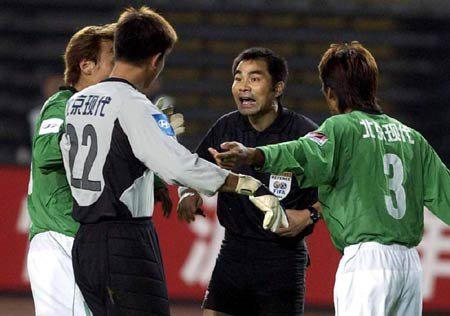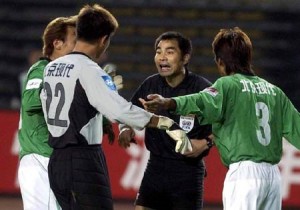Many believe that you can find a nation’s identity in how it plays soccer, often leading commentators to tie the rampant corruption in Chinese society with the corruption that exists in the Chinese game. Match fixing is not unique to China, even the world’s top leagues like the English Premiership and Italian Serie A have dealt with scandals over the last 20 years, but no league has faced the number of scandals that the Chinese Super League has dealt with. The name itself was part of a rebranding to distance Chinese professional soccer from the scandals of the past, a supposedly fresh start.
Last week, with the season days away from kicking off, revelations came out about two long suspected instances of match fixing. At first, it was a feeling of relief, justice had been done, the truth is out, I always suspected there was something fishy going on and indeed there was. Thinking about it more, however, and it was easy to become frustrated with a story that didn’t make sense. The referees involved in the incident had been in police custody for 6 months or more, why was the government only releasing this information now.
In 2004, in what was one of the most shocking incidents in Chinese soccer, Beijing Guoan players walked off the pitch at Shenyang’s Wulihe Stadium to protest a controversial penalty call given to the home side, Shenyang Ginde. The referee had been favoring Shenyang all match, including a very questionable early red card to Beijing’s top foreign player.
Guoan’s response to that late penalty, leaving the field, always seemed embarrassing, one of the worst examples (of many) of Chinese football player petulance, but when it came out that the referee received over RMB200,000 from Shenyang’s manager, there’s a feeling of redemption.
The other major incident was in 2005, involving Lu Jun, the first referee to represent China at the World Cup, during the Shanghai derby that year, a match with major title implications at the time. With the match being on national television and media attention surrounding it, Lu was somewhat hamstrung from blatant favoritism, however he was still able to take it easy on Shenhua, who ended up winning the match and going on to take the league title that year.
One has to wonder why no calls have been made to punish Changsha Ginde (the club left Shenyang after the 2007 season) or Shanghai Shenhua for their roles in these match fixing scandals. Most of all, the timing leaves something to be desired. Why wait until days before the start of the new season to release this information, sure the timing appears targeted to when the news will have the greatest impact, but it also appears to be an attempt to sweep it all under the rug a “move on, there’s nothing to see here, we’ve taken care of it” approach by the government and the Chinese Football Association.
The Chinese Super League tends to leave fans in the dark, making it hard to create a trust between fans and the league, so when news like this comes out, its only logical that fans are suspicious that there’s more to the story than what they’ve been told. At the same time, many of us want to just ignore these stories as they confirm our worst fears about the league, a week into a new season, we should be able to focus on the football instead of, literally, criminal officiating and match fixing. In this instance, we have to put our faith in the government and hope that when they say match fixing is no longer part of the sport, they mean it.
When I’m standing on the terrace Sunday night at a renovated Worker’s Stadium, alongside 35,000 of my closest friends, my mind won’t be on whether the referee is corrupt or not, it will be on Pacheco’s starting XI and how we can stop the threat of Ramirez and Hangzhou’s attack, after all, that’s all that matters.


Good to have you aboard! I’ve had your CSL tagged blog entries on my favourites for some time and read them regularly so am looking forward to reading more of your stuff. Best of luck, Charlie